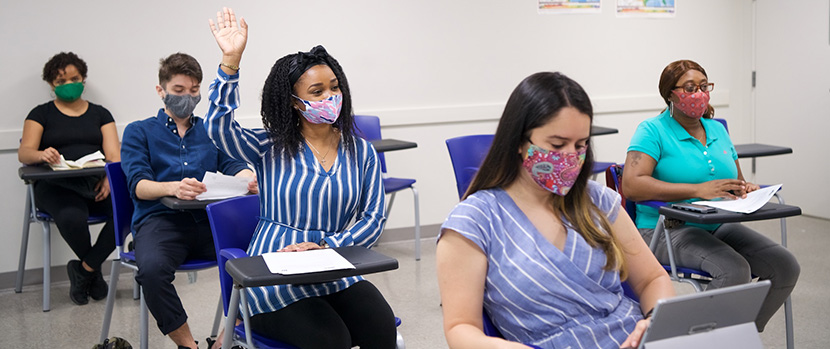
BMCC is offering a series of professional development workshops to provide students with specific career-oriented skills. These workshops are free of charge and most can be completed in less than a day. Students who successfully complete one or more workshops will receive certification, which will be noted on their Co-Curricular Transcript (CCT). The Early Childhood Center, Health Services, Public Safety, and Student Affairs have collaborated to create these training opportunities.
Cardiopulmonary Resuscitation (CPR)/Automated External Defibrillator (AED) and First Aid Training
Students are trained to provide first aid, CPR, and use an automated external defibrillator (AED) in a safe, timely, and effective manner. This training is not for healthcare workers. The goal is to equip individuals with the basic skills needed to assist in an emergency. As a result of this activity, students will:
- Learn first aid basics for emergencies: medical, injury, environmental, and opioid-associated life-threatening situations
- Understand how to prevent illness and injury
- Use adult, child, and infant CPR and AED
- Instructor-led in-person training
- 7-hours
Child Abuse and Mandated Reporter Training
Students learn definitions, indicators, and how to make a report to the New York Statewide Central Register. As a result of this activity, students will:
- Confidently and accurately report child abuse or maltreatment/neglect
- Evaluate situations to determine reasonable cause to suspect child abuse and maltreatment/neglect
- Identify physical and behavioral indicators associated with child abuse and maltreatment/neglect
- Describe legal frameworks for mandated reporters and the New York State Child Protective Services
- Instructor-led with training options of online and in-person
- 2-hours
Dignity Act Harassment, Bullying, Cyberbullying, and Discrimination in Schools: Prevention and Intervention (DASA) Training
Students learn the social patterns of harassment, bullying and discrimination, marginalization and microaggressions, including but not limited to those acts based on a person’s actual or perceived race, color, weight, national origin, ethnic group, religion, religious practice, disability, sexual orientation, gender, or sex. It is addressed from a proactive than a reactive position, present the “goal” as creating an affirming educational environment for all students through school culture and climate, cover the identification and mitigation of harassment, bullying and discrimination, and strategies for effectively addressing problems of exclusion, bias, and aggression in educational settings. As a result of this activity, students will:
- Understand the components and operational definitions present in the Dignity Act
- Develop and enhance awareness and sensitivity to the range of experiences of the specific student populations as named in the Dignity Act
- Understand how school climate and culture have an impact on student achievement and behavior
- Recognize bullying, harassment, and discrimination, including indicators, early warning signs, prevention and intervention, and how to interact with families of victims and aggressors
Enhance the understanding of diversity and multi-cultural environments and examine personal biases - Articulate the Reporting Requirements for Educators as specified in the Dignity Act
- Instructor-led with training options of online and in-person
- 6-hours
Emergency Medication Administration Overview (EMAO) Training
Students are trained to minimize the fear and anxiety associated with the administration of emergency treatment. As a result of this activity, students will:
- Learn how to administer an EpiPen, a nebulizer, and an asthma inhaler using best practice techniques
- Learn the signs and symptoms of anaphylaxis and asthma, permissions required for the administration of these emergency medications, and the development of a child’s special needs health care plan
- Instructor-led in-person training
- 2-hours
Mental Health and First Aid Training
Students are trained to identify, understand, and respond to signs of addictions and mental illnesses. As a result of this activity, students will:
- Help support an individual until appropriate professional help arrives
- Assist someone experiencing a mental health crisis such as contemplating suicide
- Know the 5-step action plan known as ALGEE, which includes assessing risk, respectfully listening to and supporting the individual in crisis, and identifying appropriate professional help and other support
- Learn the risk factors and warning signs for mental health or substance abuse problems
- Understand the impact of illness on individuals and families
- Know about evidence-supported treatment and self-help strategies
- Instructor-led with training options of online and in-person
- 6-hours
New York State Education Department Approved Training in the Needs of Children with Autism
Students are trained to provide up-to-date information on the clinical and associated features of Autism Spectrum Disorders (ASD). As a result of this activity, students wil:
- Learn how Autism Spectrum Disorders (ASD) manifest themselves and present unique instructional and learning challenges within educational settings
- Learn the evidence-based, proactive strategies for helping children and adolescents with ASD succeed in schools today
- Instructor-led with training options of online and in-person
- 3-hours

